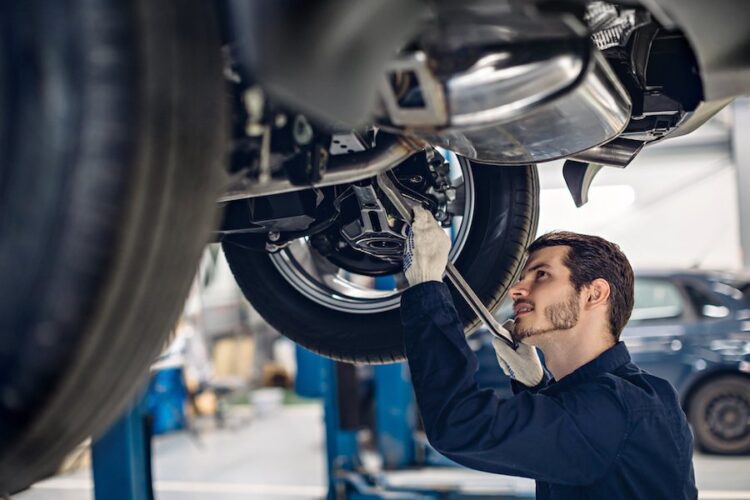- The differences between mechanical breakdown insurance and other protection plans like extended warranties are small but important.
- Read our comparison of these two options to determine the right fit for your vehicle.
Affiliate disclosure: Automoblog and its partners may be compensated when you purchase the products linked below.
Owning and maintaining a car can eat up a large chunk of your annual budget. According to the Bureau of Labor Statistics, the average adult (25 to 55 years old) spends roughly $1,206 a year on car insurance and another $745 on maintenance and repairs. In addition to hundreds or thousands of dollars for gas, accessories, and financing charges, there is little room in any budget for mechanical breakdowns.
If you’ve been looking for a way to save on car repairs, you may have come across both mechanical breakdown insurance (MBI) and extended warranties as options.
Keep reading to learn the difference between these two options. We’ll explain why we think extended warranties offer additional benefits that may be lacking under mechanical breakdown insurance, using third-party extended warranty provider CARCHEX as our example.
What Is Mechanical Breakdown Insurance?
Mechanical breakdown insurance covers repairs or replacement parts in the event of an unforeseen breakdown, not including accidents or routine maintenance. Insurance companies normally provide MBI plans. As an insurance policy, mechanical breakdown insurance is paid through an annual payment and a deductible or co-pay for repairs.
Mechanical breakdown insurance is not the same as the following coverage:
- Car insurance—This type covers automobile accidents, including vehicle damage and bodily harm caused by collision. Auto insurance is legally required for all drivers.
- Manufacturer’s warranty—This warranty is included with the price of the vehicle to protect new car buyers from paying for faulty factory parts or workmanship. The manufacturer covers repair or replacement of a range of parts for a specific number of years or miles.
- Extended warranty—Considered a service contract, this warranty can be granted by the manufacturer or a third-party company. An extended warranty covers vehicle systems and components after the manufacturer’s warranty expires. These contracts have year and mileage limits as well.
What Does Mechanical Breakdown Insurance Cover?
If mechanical breakdown insurance doesn’t cover accidents or maintenance, what exactly does it cover? Coverage varies by insurance provider, as well as the age and model of the car. Some cars, unfortunately, are just more expensive to insure and repair.
Typically, mechanical breakdown coverage includes the more important parts of the vehicle, such as the powertrain:
- Drive axle
- Transmission
- Engine components
- Electrical components
In premium plans, mechanical breakdown insurance may also cover brake systems, steering, suspension, air conditioning, and some digital components. It makes sense these more comprehensive “bumper-to-bumper” plans cost more.
You should not expect mechanical breakdown insurance to cover basic repairs and maintenance like tire rotations and replacements, oil changes, brake pads, and windshield wipers. These are considered routine or preventative maintenance and therefore aren’t covered. The same goes for corrosion and everyday wear and tear.

Where Can I Get MBI Coverage?
Mechanical breakdown insurance is provided by car insurance companies, and sometimes banks and credit unions. It can be available for new and used vehicles.
Sometimes, an MBI plan isn’t true mechanical breakdown insurance. This is often the case with insurance providers that use third-party underwriters to provide customers with vehicle protection plans. These companies sometimes refer to what would actually be an extended warranty as mechanical breakdown insurance. The plans are still backed by insurance companies and the regulations that govern them, so they’re often considered trustworthy coverage options. In fact, the state of California requires all vehicle service contract providers be backed by an insurance provider, unless they maintain a certain quantity in assets.
Insurance companies that muddy the waters between mechanical breakdown insurance and extended warranties include Allstate, Progressive, and Mercury Insurance.
When Should I Get Mechanical Breakdown Insurance?
You can purchase mechanical breakdown insurance after buying a new car, and eligibility usually ends after a certain number of miles. Mechanical breakdown insurance can be a supplement to your required auto insurance.
Before purchasing mechanical breakdown insurance, you should ask if it’s right for you. Is coverage minimal or extensive? Is your vehicle eligible? Is it more expensive than an extended warranty? Are you a high-mileage driver, and if so, do you expect to have expensive repairs or breakdowns in your future? These are all questions that should be answered before you sign a contract.
How Are Extended Warranties Different?
An extended warranty isn’t an insurance policy. Rather, it’s a service contract usually provided by a dealer or third-party company that covers the costs of mechanical breakdowns. These contracts are available for new or used cars, but they only cover repairs once the manufacturer’s warranty expires. Regular wear and tear isn’t usually covered, nor is damage caused by neglect or poor maintenance.
This sounds pretty similar to mechanical breakdown insurance, so how is it different? Here are some ways:
- There may be limitations on where you can get repairs, but the best providers offer flexibility.
- Some extended warranty providers pay the repair shop up front, while others reimburse you.
- Some extended warranties may be sourced by brokers who find competitive rates across different provider plans.
- Extended warranties usually provide extra benefits like towing, trip interruption, fuel delivery, rental car reimbursement, and roadside assistance.
- Extended warranties are good options for high mileage cars, older cars, and used cars, and can be purchased at any time. Some MBI plans must be purchased before a car is 15 months old (e.g. Geico MBI plans).
There are many reputable extended warranty providers. As an example, let’s look at a breakdown of one of the top extended warranty providers, CARCHEX.
Extended Warranty Coverage from Third-Party Provider CARCHEX
CARCHEX offers five levels of coverage with several plans under each tier, all backed by industry leaders like American Auto Shield and Royal Administration Services.
The highest level of coverage – Titanium – is bumper-to-bumper coverage for up to 10 years. It covers your car’s systems and components with a short list of exclusions. New and pre-owned vehicles are eligible for coverage.
The lowest level of coverage – Bronze – is a basic powertrain warranty with terms up to six years. As the most affordable option, it covers the engine, drive axle, and transmission components.
The coverage offered in the middle three levels – Platinum, Gold, and Silver – range between bumper-to-bumper and powertrain. These can be referred to as “stated component coverage” or “powertrain plus” plans. Terms last six to 10 years, and new and pre-owned vehicles are eligible.
CARCHEX protects cars under 150,000 miles. Considering some mechanical breakdown insurance providers limit terms to under 100,000 miles, an extended warranty could be an alternative to this type of insurance.
If you’re interested in an extended warranty, a CARCHEX representative can help you understand what plan would be best for your vehicle. To talk to one of their experts and get a free quote, call 866-254-0205 or visit their website.

Should I Choose An Extended Warranty Over Mechanical Breakdown Insurance?
Even though mechanical breakdown insurance and extended warranties are similar, choosing one over the other comes down to pricing, your vehicle, and your personal preferences.
Mechanical breakdown insurance is an option for new vehicles with less mileage, but older or more expensive cars may not be eligible. With this type of policy, it can be easier to pay the monthly payments rather than a large repair cost up front, but extended warranty providers often offer similar payment options. Also, mechanical breakdown insurance doesn’t normally cover wear and tear items or offer extra perks like rental car reimbursement.
Extended warranties can provide the same level of bumper-to-bumper coverage with extra perks. Your extended warranty may also provide longer coverage for high-mileage vehicles and used cars, which are more likely to have mechanical breakdowns.
Finding A Reputable Extended Car Warranty Provider
What makes a warranty company reputable and trustworthy? After all, insurance providers already have a trustworthy reputation due to their adherence to regulations.
One of the main factors is a warranty company’s ability to pay for the repairs it promises. Companies backed by insurers are guaranteed to have the capacity to pay up. In addition, top companies will pay the repair facility directly, so you don’t have to come up with the cash up front.
Why A CARCHEX Extended Warranty Is A Reliable Option
Not all extended warranty companies are made the same, but CARCHEX can provide the same level of trust and quality service as many mechanical breakdown insurance providers. CARCHEX has a strong history in the warranty industry, and reviews are positive overall.
- Better Business Bureau rating of A+ and accredited since 2009
- Shopper Approved rating: 4.4/5
- “Top Pick” award by ConsumerReviews.com for six consecutive years
- 2017 “Top Pick” and 10.0 score from ThoroughlyReviewed
- Positive customer service reviews
- Positive reviews of the claims process
In addition, Kelley Blue Book, CARFAX, DMV.org, and several other respected companies have chosen to recommend or partner with CARCHEX.
Let CARCHEX Help You Make Your Decision
To get a free quote and a better understanding of what you might pay with CARCHEX coverage, call 866-254-0205 or fill out the form online. An agent can discuss the type of plan that’s right for your car, as well as optional add-ons that can provide even better coverage and peace of mind.
from Automoblog https://ift.tt/2JuBdl9

No comments:
Post a Comment